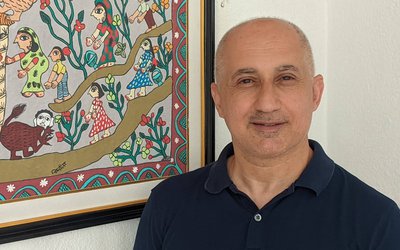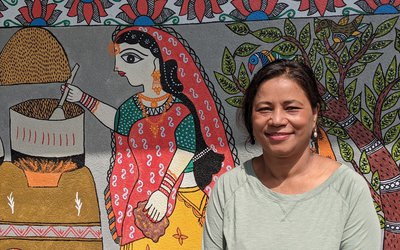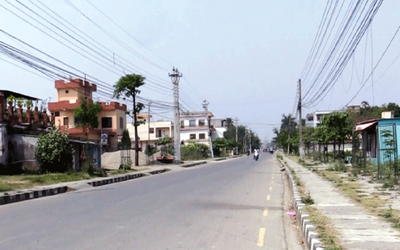SUDIP PATHAK, president of Human Rights Organization Nepal, is a known name in Nepal’s human rights movement. Having spent more than 35 years for the cause of human rights, Pathak has established himself in the sector. Former member of National Human Rights Commission, Pathak spoke to NEW SPOTLIGHT on various issues regarding human rights activities in Nepal. Excerpts:
What do you say about human rights and human wrongs?
In the last three decades, we have been focusing more on the issue of rights, rights as international declaration on human rights stipulates. We have been pressing the government to make Nepal as a human rights friendly state. We have been preaching for the protection of human rights of all Nepalese as per the international convention on human rights. But, in the name of rights, we also protect the human wrongs. What is required is the state should run in accordance with the rule of law and citizens should be made responsible. We have focused a lot of time for rights but we have yet to raise the question of wrongs. We are taking all rights and wrongs with the same approach.
What is the “wrong” approach?
Even the wrong aspects of the human beings are taken as rights. Along with rights, there come responsibilities as well. One need not violate the other’s rights while exercising his/her rights. One group organizes a massive demonstration undermining the rights of others. Similarly, one group calls a general strike without taking care of other individual’s rights of mobility. We do everything for protection of owns rights but we don’t have the tendency to understand the rights of other citizens. Frankly speaking, we have not advocated responsibility compared to rights. We have a culture of demanding rights. Women, children, labor, students, farmers, Dalits and others say they did not get anything. Human rights as a slogan helps little.
What is wrong with the approach?
Our approach has been rights focused. Recently, some groups have started to criticize the past or 240 years of our history as a dark side. For example, nobody including Brahimins, Cheetris, farmers, women and labors had rights during the Rana period. Now particular groups have been saying that they were deprived of rights in the last 240 years. If you see the history of Nepal, nobody enjoyed human rights during that period. All castes were deprived of basic human rights in that period. This is the reason all the people revolted in 1951, demanding all kinds of freedom.
What does Nepal need to focus on?
Along with rights, we need to look at responsibilities as well. We must establish precedents that acts against the law are punishable. As human beings, we need to be prepare to say ‘no’ if we can say yes. Human Rights organizations need to reorient the approach. We have to advocate what is right and what is wrong.
How do you assess the human rights movement?
There are many lacunas in the human rights movement. Firstly, our approach to raise the human rights issues is itself wrong. Secondly, a particular section of people are involved in the human rights movement. We must not forget that the person involved in the rights movement has his/ her own norms, ethics, rights, views and internal democratic practices. We are yet to promote internal democracy in the rights based organizations. Why do we need human rights? Even after more than three decades of struggle, we still see the rampant violation of human rights. Human rights should not be limited to certain groups and individuals and they must be universal.
What other impressions you want to share about rights?
We are able to make the human rights as a fundamental issue in our context. Having faced all kinds of problems, Nepal, a small country, needs to work to enhance the livelihood of the people and to make Nepalese prosperous. Along with this, we have a great challenge to save our nation. We have multiple challenges. We need to protect the state as well as we need to feed the people.
How do you actually define human rights?
Human rights are universal and they have only one definition and that is applicable to all. The universal human rights are the same for all whether Indian, Chinese, American or Nepali, Iranian or Iraqis. There is only one definition of human rights. Human Rights are inherent rights of every individual. Everyone can get sunlight, air and water and these are inherent rights of individuals. However, these rights need to be exercise with human dignity. Every individual needs certain rights like freedom of expression, freedom of choice, right to get education, rights to move freely and rights to information.
How do you see the present context of raising the issue of human rights on the basis of sectarian approach like women rights, youth rights, rights of indigenous people, and rights of disabled and so on?
There are certain inherent rights in human rights and that is applicable to all. The present trends to define the rights on the basis of various sects, groups are to take the rights based issue at micro level. These trends came after there was a big gap among various stakeholders in terms of enjoying the rights. The Universal Declaration of Human rights accepted a long time back that women and children had been deprived for a long time. When the issue started to be raised about women and children, it brought drastic results in protecting women’s rights. Women’s voices are strongly being raised now. This is a fast track approach. Non-violence is the foundation of human rights.
How did the rights movement evolve in Nepal’s context?
In the context of Nepal, the state denied the basic rights like right to organization, freedom of speech and rights to dissent during the Panchayat. The human rights movement in Nepal began against the oppression of the state. Even after the restoration of democracy, it has not changed much. It went extremely bad during the period of insurgency when innocent citizens were killed either by state or rebels. I joined the human rights movement in early days demanding basic individual rights with state like guarantee of rights to speech, right to life and right to freedom to move. We opposed decisions like capital punishment to Yegya Bahaudur and Bhim Narayan and I opposed the flags standing above the wall of Nepal Law Campus.
Who is the protector of rights?
I always say the state is the protector of human rights. It is the state which needs to guarantee security and safety to its citizens. I move freely even in midnight considering that the state will protect me. In this regard, the state is a basic institution to protect the rights of individual. The role of human rights activists is to raise the concern and issue in case the state does not protect the individual rights. In our context, what happens is human rights activists have to play the entire role. If state protects the human rights, then the role of our organizations will be reporting and advocacy.
Are human rights protected in Nepal?
After the signing of CPA, Constituent Assembly elections, there is a feeling that the human rights situation has improved. Before 2006-07, ratio of killing people was high. After the CPA, the number of death declined. But, even after establishment of Octant in 2007, more than 1,500 people were killed. What I can say is that the killing of people is gradually declining. What I can also say is kidnapping, tortures, and bandhas have not stopped yet. There is some progress in human rights situation but it is yet to completely improve. Our state participated in Geneva and expressed its commitments. The recent record shows that there are no cases of disappearances and use of force from government side. The government too has not committed any atrocities. There is progress. There are rare cases of inhuman killings. But, the situation is not under complete control.
How do you look at yourself as a human rights activist?
Working for human rights activists or human rights movement is for the protection of people’s rights. That means we are working for Nepalese people and Nepal as a nation. There are two elements: rulers ruled. Whenever there comes any issue of rights violation, we need to take an intensive research. Human rights violation cannot be taken on the basis of rumors. Rights activists are not coming from blue moon, they are also human species. It is not just an issue of allegations. As a human rights activist, what we do is investigation on the issue.
It is said that Nepal’s security institutions are widely involved in human rights violation. What do you say?
I cannot believe that institutions related to security agencies like Nepal Army, Nepal Police and Armed Police encourage rights violations. There may be some individuals in them. In my last two and a half decades as a human rights activist, I have not found that Nepal’s security agencies have been involved institutionally in violation of human rights, disappearances and so on. Instead of blaming the institutions, we need to go for individuals who commit such acts. The country is my center whenever I raise the issue of human rights. There is the need to completely protect the rights of every individual.
You are in the forefront of the Tibetan Refugees issues. Some accuse you of being a supporter of free Tibet Movement. What do you say?
I have always been in the forefront to defend the rights of refugees living in Nepal. I always come to defend the rights of refugees whether they are Tibetans, Bhutanese or any other refugees. When the state grants the status of refugees, it must guarantee their fundamental rights also. I have nothing to do with their political issues. As a citizen of Nepal, I respect Nepal government’s policy on China. I have never preached any free Tibet movement. Since we have been granting status of refugees to Tibetans, they must be given rights to exercise the rights of refugees. That is all. They should not be harassed as being Tibetan refugees as long they respect the law of the land.
As a human rights activist, I have to speak when I see there is discrimination among refugees. When the government issues travel documents to Bhutanese refugees for five years period, why are Tibetan refugees not given such documents. The children of Tibetan refugees living outside the country are in dire situations as they cannot get education outside camps due to lack of travel documents. This kind of injustice should not be there. As long as Tibetan refugees respect and abide by the rule of land, they should be given proper and human treatment. I have been defending their refugees’ rights not prescribing their political views. As a patriotic citizen of Nepal, I follow the policy of my country regarding China. I would like to request the government to introduce Refugee Law and restart the process of issuing travel documents to Tibetan refugees. We can settle all the problems. I don’t understand why a section of people tries to project me as an anti-Chinese?
- TANAHU HYDROPOWER PROEJCT: A Significant Achievement
- Apr 15, 2024
- AMBASSADOR HANAN GODAR: Sharing Pain With A Nepali Family
- Mar 30, 2024
- VISIT OF KfW AND EIB TO NEPAL : Mission Matters
- Mar 25, 2024
- NEPAL BRITAIN SOCIETY: Pratima Pande's Leadership
- Mar 24, 2024
- NEPAL ARMY DAY: Time To Recall Glory
- Mar 15, 2024
















